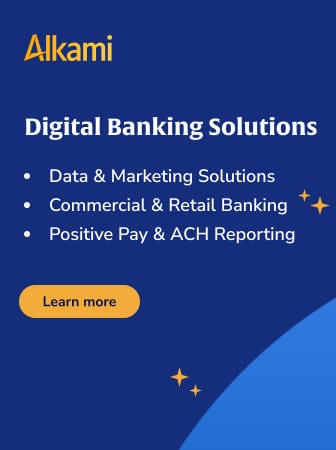Virtually unknown just a few years ago, earned wage access in one form or another has aggressively gained favor, particularly among Millennials, hourly workers and those in the gig economy. “EWA” — also known as on-demand pay — basically means that workers can access pay they have earned, at little or no cost, at any time during their normal pay period.
Business customers see it as a way to boost employee loyalty, retention and recruitment. Financial institutions that can accommodate it see it as a way to strengthen relationships with small business or even corporate customers.
Several fintechs have emerged to offer the service to employers, and a handful of banks have partnered with them to tie the service into their overall treasury management offerings.
Citizens Financial Group is one of the early adopters. “Post Covid we felt it was an offering that added value in the market, certainly for employees and also for employers,” says Matt Richardson, who runs the product management group within the Treasury Solutions business at Citizens.
“As payment systems continue to innovate and expectations changed with the arrival of the gig economy we decided to look for a partnership where we could offer a solution to our corporate customers, that they in turn could offer to their employees,” Richardson explains.

Community Bankers’ Top Priorities This Year
CSI surveyed community bankers nationwide to learn their investments and goals. Read the interactive research report for the trends and strategies for success in 2024.

Industry Cloud for Banking from PwC
See how PwC's Industry Cloud for Banking can help solve everyday business challenges.
Citizens Financial’s Approach to On-Demand Pay
The way EWA generally works is, as employees build up earned wages within a defined pay period — weekly, biweekly, monthly — they can access those earned wages at no cost or a small flat-rate cost any time before the normal payday. Especially for hourly workers, this relieves stress caused by unplanned expenses that occur in the middle of the usual pay period. The employer just deducts whatever was accessed through EWA and then pays the employee the difference on payday.
Growing Pains:
According to one survey, seven in ten middle market companies offer EWA, but many arrangements suffer from inefficient or temporary processes.
Citizens Financial conducted a survey of 200 middle-market companies and found 71% already are using EWA services in some form. However, implementation by these employers varied widely, from manual or bespoke processes, informal arrangements, to a one-off basis. Citizens partnered with Netspend to offer corporate clients a clearer format.
“What this does is put a whole structure around that process,” says Richardson, “including an interface and application for employees to utilize to request their earned wages. There is no cost to the employer. If an employee chooses to access earned wages, there are ways for them to do that, some with no cost.”
Citizens’ EWA options are as follows, once employees download an app:
- Direct deposit to their bank account via ACH — no fee.
- Direct deposit to their Netspend paycard — no fee.
- Direct deposit to their bank account in real-time — up to a $3.99 flat fee per transaction.
Even with this latter option, individual companies could choose to cover the fee for their employees.
Read More:
- How Chase Plans to Revolutionize Rent Payments with a Digital Solution
- ‘Pay By Bank’ Trend Is Next Front In Merchants vs. Banks Payments War
What Banks Get from Offering Early Wage Access
While still in early days, corporate client response has steadily grown. “The response has been really great,” says Kavita Kurella, director of Product Strategy and Merchant Services at Citizens. “Some of our corporate customers haven’t even heard of this and they are very intrigued, particularly how it can help them in their talent acquisition and retention strategies. “In this very tight and competitive labor market, this is a tool for them in their employee benefits toolbox. More important, this is one offering they can provide their employees with no additional cost, and no working capital impact.”
While acknowledging that one option of its EWA program has a revenue component, Richardson says providing it is more strategic. “If we can offer [business customers] a tool that helps them provide a benefit to employees, and that helps them retain and/or attract talent, then they’ll remember that we were the ones that gave them the idea,” he says. “The primary motivation was to be able to bring what we think is an important idea to our corporate clients.”
PNC and U.S. Bank: Two More Early Adopters
PNC Financial is another early adopter. In early 2022 its Treasury Management unit debuted PNC EarnedIt, powered by DailyPay Marketplace, that offers access to earned pay throughout any point in the pay cycle prior to the normal payday. It is accessible to customers’ employees via a mobile application at all times.
Seismic Pay Shift:
Employees want pay in real time, and many companies are leaning toward saying goodbye to the traditional pay period.
Employees select the speed — either immediate or next business day — they would like to receive a portion of their earned pay, delivered to their existing bank accounts or the card of their choosing.
“Consumers increasingly want access to their pay in real-time to make informed financial decisions,” says Chris Ward, head of Data, Digital, and Innovation for PNC Treasury Management.
Similarly, U.S. Bank partnered with Payactiv to offer EWA payroll disbursements on-demand through an immediate direct deposit to their U.S. Bank Focus Card.
“The future of payments is one where companies may soon say goodbye to the traditional, biweekly payroll,” said Shailesh Kotwal, vice chair, U.S. Bank Payment Services. “Employers recognize that providing employees on-demand access to earned wages improves employee satisfaction and recruiting efforts.”
Dig Deeper: How PNC Adapted Its Virtual Wallet to Solve Overdraft Complaints

EWA, While Still New, Is Rapidly Going Mainstream
The onward rush of earned wage access is borne out by several recent surveys. For example, an ADP survey this summer had these conclusions:
- Interest in EWA is evident in every age group, at every educational level, and at every income level. On average, 66% of employees working for companies that didn’t offer EWA said they would be interested if their employer were to offer it.
- EWA adoption exceeds expectations, with 62% of employees who have opted in saying they use it every or every other pay period.
- Millennials prioritize job offers, at a 59% rate, from employers that offer EWA.
DailyPay, an EWA fintech, cites several other surveys. One, by the Society for Human Resource Management, says EWA is now offered by 5% of large U.S. companies that mainly employ hourly-paid workers, but the figure is expected to rise to 20% by 2023. Another survey, by PWC, claims EWA raises employee retention by 36%.
As far as marketing the EWA service, Citizens Bank takes a low-key approach. Its in-house sales force and bankers who have relationships with various business customers present it as they conduct periodic client conversations. “We have seen a lot of interest in this,” Richardson says. “It’s not something where we have to convince corporate customers that they should have this discussion with us. It’s more like, we bring it up and they’re very intrigued and they want to know more … The way we’re judging success for this right now is the interest that we’re generating amongst our commercial client base.”
Structured Correctly, It’s Not a Loan
One perceived obstacle to incorporating EWA relates to compliance. Is an EWA advance a loan, and thus subject to Truth-In-Lending Act requirements? That’s what the National Consumer Law Center said in 2021 congressional testimony.
However, the Treasury Department has proposed significant changes to the tax code that:
- Defines an on-demand pay arrangement that allows employees to withdraw earned wages before their regularly scheduled pay dates.
- Provides that the payroll period for on-demand pay arrangements is treated as a weekly payroll period, even if employees have access to their wages during the week.
- Clarifies that on-demand pay arrangements are not loans.
- Provides special payroll deposit rules for on-demand pay arrangements.
These proposals would take effect Jan. 1, 2023.
In structuring its EWA offering Citizens discussed the issue extensively with its provider, Netspend, to make sure there was no interest rate-based cost related to dollar amounts or time, but just, in some cases, a flat rate. “We felt it was a pretty straightforward and easy to understand product,” Richardson says. “There wasn’t any sort of concern about employees accessing something they didn’t understand or setting themselves up for variable costs that they couldn’t properly predict.”







